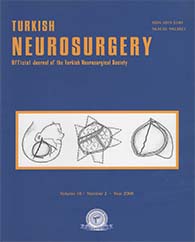3,4,5,6Department of Biochemistry, Eskişehir Osmangazi University School of Medicine, Eskisehir, Turkey OBJECTIVE: Adenosine and nitric oxide (NO) are known as vasodilatators. We investigated adenosine deaminase (ADA) activity and NO concentration in the cerebrospinal fluid (CSF) of patients with subarachnoid hemorrhage (SAH).
METHODS: Forty patients with SAH and 10 controls were included in the study. Nitrate level and ADA activity were measured in CSF. SAH patients were grouped according to the presence of angiographic vasospasm, Hunt and Hess grading, Glasgow Coma Scale (GCS) and Fisher Grade (FG).
RESULTS: The level of NO markers in SAH patients decreased when compared to that in the control group (p<0.05). However, NO markers in patients with vasospasm was higher than in that of patients without vasospasm (p<0.05). ADA activity increased in patients with SAH (p<0.01) and also patients with angiographic vasospasm (p<0.05). ADA activity in the poor-grade SAH group was higher than that in the good-grade SAH group. The group with the lower GCS showed increased ADA activity compared to those with a higher GCS score (p<0.01). Furthermore, patients with FG 4 had a higher level of ADA activity compared to FG 1 and 2 and FG 3 (p<0.001 and p<0.01, respectively).
CONCLUSION: Decreased NO level may participate in the early development of vasospasm. However, the increased level of ADA activity in the SAH patients with the poor clinical and consciousness level may have resulted from the ischemic cerebral insult.
Keywords : Adenosine deaminase activity, Cerebrospinal fluid, Nitric oxide, Subarachnoid hemorrhage, Vasospasm




